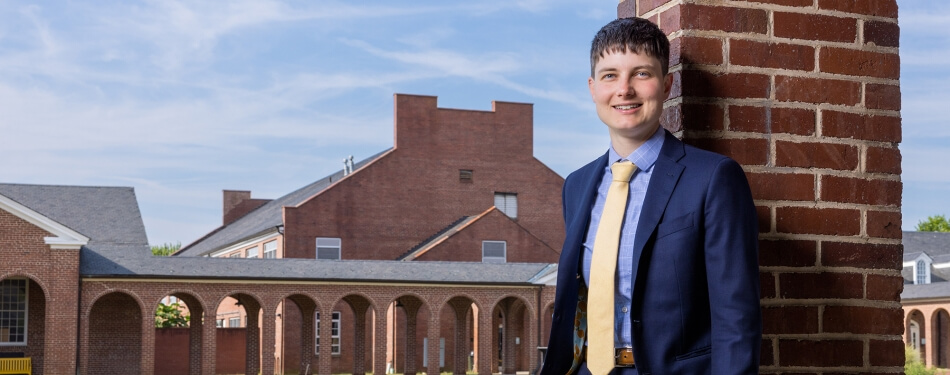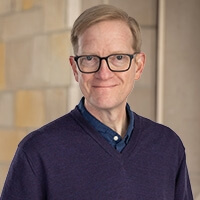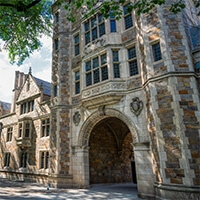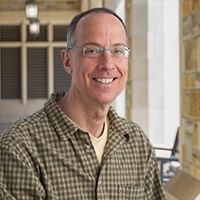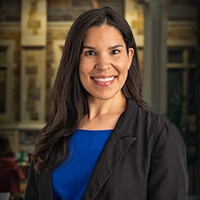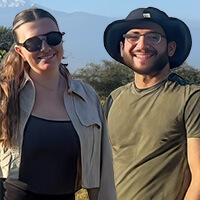Paulina Arnold worked with detained migrant parents directly after college, and that drove her desire to go to law school. After graduating and two years of clerking, she worked as a movement lawyer, partially on detention issues. And now, as a law professor, civil detention is a primary focus of her research.
Arnold brings her expertise on immigration detention and related issues—including constitutional law, habeas, and prison law—to Michigan Law this fall, as she joins the faculty as an assistant professor.
Bridging experience and academia
Arnold became involved with detention issues while working in Queens, New York, for a legal nonprofit that did family defense with immigrant parents. Often, those parents were in immigration detention, incarcerated under family court orders of protection, or civilly committed.
“The more direct work that I did, the more I realized that the law is kind of a hard stop on people’s lives,” Arnold said. “So I originally went to law school to be a direct services lawyer.”
She remained active in immigration and detention issues as a student at Harvard Law School. She worked with the Bronx Defenders, the ACLU of Southern California, and a variety of clinics and community organizations, learning more about the legal structures surrounding prolonged detention in criminal jails and immigration detention facilities.
After clerkships on the US District Court for the Southern District of New York and the US Court of Appeals for the DC Circuit, Arnold took a movement lawyer position at CASA, a grassroots immigrant advocacy organization that is funded through the membership fees of the people who it’s advocating alongside—typically low-income, working-class immigrants.
With the wide range of services offered at CASA, “I wore a lot of different hats,” Arnold said. “I was a combination employment law, labor law, and immigration law attorney, while also advising on litigation and legislative advocacy.”
Eventually, a pivot to academia felt like a natural next step.
“I’m really interested in the coercive power of the law and how the law shapes people’s lives,” she said. “At the same time, I loved law school. I loved the classes, and I loved getting deep into the logic and patterns of the law. The more that I worked and got a practical grounding in the law, the more I felt like there was a gap in the scholarship in the immigration world and in the prison space about civil confinement. It’s an area of law that has an enormous impact on thousands of people’s lives but can be under-theorized in the academy.”
Arnold’s first foray into an academic career came as a Forrester Fellow at Tulane University Law School, where she published on the relationship between immigration detention and other forms of civil detention in the Stanford Law Review. But before coming to Michigan Law, she had one more avenue to explore: clerking for Supreme Court Justice Sonia Sotomayor. “It’s a way to dip a toe in generalist law and see resonances that you might not have seen before,” Arnold said of her High Court experience. “It gave me a different perspective on my scholarship. Working for Justice Sotomayor is an incredible experience and an enormous honor. It was an exciting year to clerk, and I think it’s going to make my scholarship better.”
Ready for the challenges ahead
Arnold says a number of factors attracted her to Michigan, including a large number of faculty working in her areas of interest, such as immigration, habeas, and prison law.
“There’s a phenomenal set of faculty at the Law School,” she said. “My scholarship focuses on civil confinement, which is an aspect of law that touches many others, so I’m excited to start those conversations across different areas of the law. In addition, Michigan has such a strong reputation for public service, and among its students and alumni. Everybody I meet from Michigan seems to have had a wonderful time at the school.”
Arnold is excited to get back to her scholarship, and to prepare to teach Civil Procedure in the spring.
“I look at Civil Procedure as about the power of courts, which is a similar theme throughout my scholarship. When you think you have all these rights on paper, can you get a court to do anything about it? You have to teach a lot of rules alongside a lot of concepts, but I’m looking forward to getting students excited about both.”
Most of all, she looks forward to becoming part of the Michigan Law community. “I’m excited to meet the students and to return to faculty workshops. After a year clerking for the Court, I can’t wait to see what everybody has been thinking about and working on.”

